Ljubljana related
Mladina: Police found EU Commission dictated bank bailout in criminal fashion
STA, 3 May 2019 - Lies, Lies, It's All Lies, reads the title of the latest Mladina editorial, which comments on the findings of the National Bureau of Investigation (NBI) probe into the 2013 bank bailout. According to the left-leaning weekly, the European Commission determined the value of Slovenia's allegedly bankrupt banks without any sort of methodology.
Commenting on what appears to be a leaked criminal complaint filed by the NBI last December against the entire former board of Banka Slovenije, Mladina's editor Grega Repovž says a long time has passed since the emergence of a document that would reveal the actual methods of the European Commission so clearly.
Repovž says the report of the NBI probe - over which Slovenia is being sued by the European Commission - into what was happening at the Slovenian central bank before the bailout reads like a conspiracy theory or a script for a bad movie and warrants a European investigation into the Commission's workings.
Repovž says officials in Slovenia were initially resisting pressure from the Commission to wind up recapitalisation needs but eventually caved in and started to focus on covering the tracks, thus becoming complicit in a crime.
The value of the banks was actually determined by the Commission, which ignored all the actual findings and failed to explain its methodology.
Slovenian police were hoping to find the contentious methodology that would explain the final figures but their eventual discovery was the worst possible - there was no methodology.
"We declared three banks, which were actually not in such a bad state, as bankrupt, pumped EUR 4.78bn into them ... and then accepted the commitment to sell these falsely bankrupt banks," Repovž says.
He argues that it seems Slovenia was truly being used as a guinea pig for enforcing the bail-in principle and for preventing a joint shouldering of the burdens of troubled countries.
However, while NKBM and NLB, stuffed with excess capital from the bailout, were privatised in line with promises given to the Commission, Prime Minister Marjan Šarec cannot continue pretending old commitments need to be honoured and ignore the findings of the probe as Slovenia is in the process of also selling Abanka.
Note – The STA didn’t provide a summary of Demokracja’s editorial this week, but the following is from last week’s Reporter, another right-wing weekly.
Reporter: Unlikely Homeland League will take away SDS votes
STA, 23 April 2019 - Commenting on the ongoing EU election race, the weekly Reporter says in its latest editorial that the newly-established party Homeland League (DOM) is not likely to eat away votes to the opposition Democrats (SDS).
According to the latest poll by Mediana, the Slovenian right will be defeated on the election Sunday, 26 May, as the lists of the SDS and the non-parliamentary People's Party (SLS) as well as the opposition New Slovenia (NSi) are projected to win only three MEP seats, editor-in-chief Silvester Šurla says.
The joint SDS-SLS slate is expected to win the most votes, but only two of Slovenia's eight MEP seats. It could also win a third one by a hair's breadth, just like the SDS did five years ago.
Perhaps it will also manage to win three seats this year because of the alliance with the SLS. However, according to the latest polls, winning four MEPs is not likely, Šurla notes.
The NSi is also not likely to repeat its historic victory from 2004, when the first European election was held in Slovenia and the party won as many as two MEPs.
In the end, the left and right may very well each win four seats, just like ten years ago, Šurla says under the headline Race for Million Euro.
The centre-left has slightly more voters although they are inclined to change party preferences. Most of them currently favour the coalition Social Democrats (SD), which are projected to win two MEPs, while the senior coalition Marjan Šarec List (LMŠ) and the opposition Left would each get one.
Meanwhile, voters of the centre-right, are much more decided. This is why Šurla expects no major flow of SDS voters to the Homeland League, which does not even appear in opinion polls yet.
Perhaps, DOM could cost the SDS-SLS list of candidates only the third potential MEP seat, Šurla concludes.
All our posts in this series can be found here, and our stories on the Institute of Chemistry are here
Mladina: Chemistry Institute murder trial needs examining
STA, 26 April 2019- The left-wing weekly Mladina suggests in the latest editorial that the judiciary should take a stand on the behaviour of the judge in the Chemical Institute boss murder retrial, finding that its hard for the media to take a stand lest any criticism should be understood as an attempt to discredit him.
Editor-in-chief Grega Repovž says that judge Zvjezdan Radonjić has been conducting the case in an odd way and has not done enough to dispel doubts about his impartiality.
He notes that Mladina has questioned his engaging as an expert witness a man who like the defendant, Milko Novič, has ties with the opposition Democratic Party (SDS).
"When things were becoming increasingly unusual, Radonjić decided to swiftly wrap up the trial and prevent most witness hearings ... What is more, in declaring the decision, in conduct that is unusual in a courtroom he alleged pressure bearing upon the entire court by the media ...
"The very same day he obviously turned into a hero of people's hearts, the judge who stood up to the establishment."
"In a situation in which he declared himself a hero standing up against the system it is hard even to write about him as being unusual - given such 'heroism' any act of drawing attention to his unusual judging would automatically be understood as an act of discrediting."
This is why the media are in a difficult situation taking a position on the case, even though a Večer reporter would not be bothered and she wrote down that the judge should have been suspended because of the show he staged in court.
Instead, Repovž says that the Radonjić case calls for a serious reflection within the judiciary at last.
"Judges decided a few years ago not to take a stand on the difficulties in their ranks. This is human but judges are people whose decisions seriously affect people's lives. So this cup can unfortunately not pass them."
Demokracija: Deep state at work in judiciary
STA, 25 April 2019 - The right-wing weekly Demokracija comments on the allegations of pressure on the judge in the Chemistry Institute boss murder retrial in the latest editorial, finding that deep state remains at work in the Slovenian judiciary.
Editor-in-chief Jože Biščak names Ljubo Bavcon and Alenka Šelih as two jurists who he says were ideologists of revolutionary law under the Communist regime, and who should have been ostracised and banned from public life, but have instead won several prizes and honours.
He says that this is part of the reason for the Slovenian judiciary being in a state as described by judge Zvezdan Radonjić, who in returning the acquittal of Milko Novič, gave a dramatic account of the pressure and covert threats he had been subject.
"That was not the 'ordinary' kind of pressure, but pressure from the deep state via his judicial colleagues and superiors.
"Everyone should have beaten the drum for that, all the alarms should have gone off. However, nothing happened. Well, almost nothing," Biščak says, referring to Radonjić's superiors finding that nothing dramatic happened in the Novič case, and saying that they would no longer communicate with the public about internal procedures in the case.
"Mind you, the case that disclosed the workings of the deep state in the judiciary and how someone from behind the scenes is trying to interfere in the judgement, is an internal matter of the court!
"Not at all, dear gentlemen in Tavčarjeva 9 [the address of Ljubljana Court], it is a matter of interest to all the citizens, so you will have to provide public and regular explanations about what is going on.
"If ever, now is the right time to sweep up in the judiciary, which due to many infamous cases and systematic violations of human rights is justifiably referred to as misjustice by part of the public.
"The Slovenian judiciary has never been cleansed, has not taken the road to Damascus (like Saul, who on the road to Damascus converted from a persecutor of Christians to become the Apostle Paul), let alone being lustrated," Biščak writes under the headline Road to Damascus.
All our posts in this series can be found here, and our stories on the Institute of Chemistry are here
STA, 24 April 2019 - The parliamentary committees in charge of foreign affairs and culture have condemned the interference of Hungary in the freedom of press in Slovenia.
The committees met on Wednesday, less than three weeks after Hungarian Ambassador Edit Szilágyiné Bátorfi lodged a verbal note with the Foreign Ministry after the weekly Mladina ran on its cover a caricature of Hungarian Prime Minister Viktor Orban with his hand raised in a Nazi salute and surrounded by three politicians from the ranks of the Slovenian Democrats (SDS).
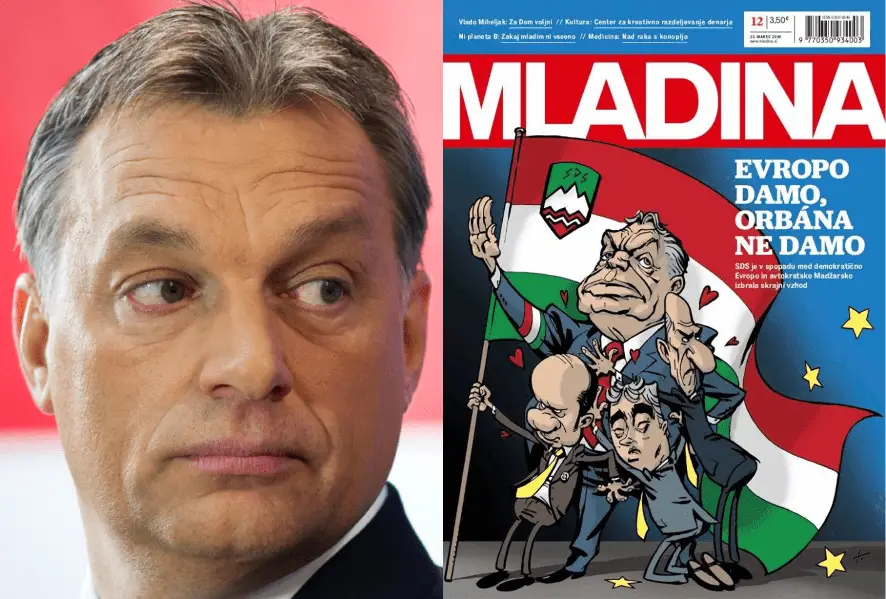
Sources: Viktor Orbán from Wikimedia - Europa Pont CC-by-2.0; Mladina’s Facebook
Apart from condemning Hungary's actions, the committees also proposed that the government make sure to protect the freedom of expression when revising relevant legislation, to preserve media ownership transparency, encourage free and plural media and install safety mechanisms to prevent interferences and pressures from other countries.
Modern Centre Party (SMC) MP Gregor Perič said at the session that Slovenia had faced "unusual responses by our neighbours", from contentious statements by European Parliament President Antonio Tajani, to Hungary's note, and wire taps indicating Croatian government attempted to prevent the release of a report about who listened in on Slovenia's representatives in the arbitration process in 2015.
Attending the session, Foreign Minister Miro Cerar said he would react decisively when basic values of democracy, human rights, the rule of law and Slovenia's sovereignty are under attack in the future.
He underlined the importance of nurturing good neighbourly relations, adding that the note lodged by the Hungarian ambassador had not caused a deterioration in bilateral relations.
Culture Minister Zoran Poznič meanwhile said that the ministry would draft a media legislation reform by the end of the year. He was responding to Mladina editor-in-chief Gregor Repovž, who called on the ministry to reform the legislation, above all to clearly define and separate the media from "propaganda working under the cover of media".
The session, called by the coalition parties the Marjan šarec List (LMŠ), the SMC, Social Democrats (SD), the Alenka Bratušek Party (SAB) and the Pensioners' Party (DeSUS), was criticised as a pre-election stunt by the opposition SDS and the Left.
All out stories about Slovenia and Hungary are here
Mladina: Government failing to protect national interest from Hungary
STA, 19 April 2019 – The left-leaning Mladina is critical of Slovenia's reluctance to protect its national interests in a commentary accompanying revelations about connections between the European Commission, the Hungarian government and a bank vying to take over Abanka. The weekly underlines that strong financial institutions are the backbone of a sovereign country.
Editor-in-chief Grega Repovž says that a journalist of Mladina found new connections between the Hungarian government and a Hungarian official at the European Commission who insisted that Slovenia privatise its banks.
The situation is becoming increasingly problematic because the revelations trigger doubts about the actions of those involved in Slovenia, as well as the expertise of the European Commission.
Mladina shows connection between the Hungarian government led by Viktor Orban and István P. Székely, who works for the commission, also highlighting the efforts of Hungarian OTP bank to take over Abanka, which is being privatised.
It wonders why the Hungarian Imre Balogh, who also has links to the Orban government, was appointed the CEO of Slovenian bad bank in 2015 and why Laszlo Urban, a member of Orban's party Fidesz, was appointed a member of the NLB supervisory board in 2016.
"What sort of network has the Hungarian government already woven in Slovenia, apart from the obvious links to the Democrats (SDS) and the media it bought from it?" the weekly wonders, adding that Ambassador Edit Szilágyiné Bátorfi had met privately with Slovenia's central bank governor Boštjan Vasle.
The world is changing and countries are pursuing increasingly selfish interests. "Small countries, above all, need to think very carefully about future relations and how to position themselves today to be safe from turbulence in the future."
But Slovenia does not have many experts capable of thinking so far in advance, Mladina says under the headline Time for the Wise.
Strong banks and financial institutions are the backbone of a country but the incumbent government does not seem to be aware of this.
It has not stopped the privatisation of Abanka although countries are fighting for "the last segment of Slovenia's financial backbone" in plain sight.
Demokracija: Politicians should not speak of media freedom
STA, 18 April 2019 – The right-leaning Demokracija says in its latest commentary that the concern for freedom of the press expressed by ruling politicians in the wake of the alleged pressures on the private broadcaster POP TV should be taken with a grain of salt, adding that journalists should actually be worried about politicians who are doing that.
The ruling politicians were quick to swear on democracy and presented themselves as defenders of media independence from politics and capital, but this care of politicians for freedom of the press should raise concern among journalists.
Friday's editorial headlined Riders of Freedom notes that, for instance, MEP Tanja Fajon of the coalition Social Democrats (SD) said on Twitter that "if there is no democracy, there could be no media freedom".
Fajon's idea that democracy ensures freedom of the press is wrong. It is the opposite: freedom of the press, individuals, expression and economy can ensure democracy, which manifests itself in various forms, the editor-in-chief of the right-leaning weekly, Jože Biščak, argues.
Slovenia has around 20,000 laws and by-laws and also has media legislation. "What is regulated by law cannot be free. The media are therefore not free, they are regulated. And the government will make media legislation only stricter."
Some have gone as far as proposing licences for journalists, which would be a very totalitarian thing, as an "expert committee" appointed by politicians would determine who is journalist and who is not.
They say this is a method to fight bad journalism, protect the public from fake media and fake journalists, and improve media professionalism. But this has no basis in reality, as despite the increasing regulation, there are a lot more media outlets today, and they are much more accessible to an average citizen.
"It is not up to the state or politicians to recognise the legitimacy of the media, it is up to every individual to choose freely what sources and media they will believe. This is how it goes in free societies."
Biščak concludes by saying that those who think that the majority of Slovenian citizens are not capable of differentiating between disinformation and information and that politics could "help" them in that, are inclined to dictatorship.
All our posts in this series can be found here
Mladina: GP resignations aimed at privatising healthcare
STA, 12 April 2019 - The left-wing weekly Mladina accuses the trade union of GPs of abusing their power at the cost of patients. This week's editorial refers to a document it says proves that the trade union Praktikum's head Igor Muževič orchestrated the current crisis among GPs to force the government's hand and ultimately lead to privatising public healthcare.
"It is a sad day for Slovenian public healthcare. The aim of these actions is not to improve the system, but to dismantle it," Grega Repovž, the editor-in-chief writes under the headline Foul Play.
He says that Mladina has obtained a signed document from 2017 which proves that Muževič's plan had been to provoke a crisis that would force the state to privatise healthcare.
Privatising healthcare would essentially turn medical practitioners into businessmen. If the trade union's demands are met, GPs would remain part of the public sector that would provide them with the necessary infrastructure, however, they would get paid as private individuals, Repovž writes.
This is an abuse of what the trade union struggle stands for. It essentially turns patients into hostages, and it would not take long for other medical practitioners to demand the same working conditions, effectively leading to a collapse of the public healthcare system.
Repovž writes that doctors' wages are among the highest in the public sector. He says the attempt to increase their income by branching out into the private sector is unacceptable and unethical, especially since it is disguised as an industrial action.
Demokracija: Double standards on media freedom
STA, 11 April 2019 - The right-wing weekly Demokracija plays down the importance of Hungary's protest over the weekly Mladina's cover portraying PM Viktor Orban making a Nazi salute in its latest editorial. It is bothered that the freedom of speech was not defended so eagerly when PM Marjan Šarec gave instructions regarding media advertising.
Hungary's protest sent to Mladina and the Slovenian Foreign Ministry was labelled a reflection of the idea of a complete media control, but the truth is that the "incident" will have absolutely no impact on the Slovenian media, editor-in-chief Jože Biščak says.
Thus, the diplomatic note sent by Hungary cannot be a form of pressure on the media or their editorial policy but merely a reaction to a controversial image of a democratically elected prime minister of a neighbouring country.
According to Biščak, much more dangerous for media freedom and the freedom of expression was Šarec's call to state-owned companies to refrain from advertising in "disobedient media".
"Is this really normal and ordinary? Is this freedom? Is this media freedom? Is this democratic? Is this in line with European values, which this government praises so much only when attacking someone, while resorting to rhetoric and measures of dictators when someone holds up a mirror in front of its face."
There is no middle way when it comes to the freedom of speech and media freedom. Either we have them or we don't. Media freedom cannot be only when the left has something to say. It is supreme hypocrisy and has nothing to do with real freedom, Biščak concludes the commentary headlined Matthew 23:27-28.
All our posts in this series can be found here
April 9, 2019
Last week ended with news of a strange diplomatic move on the side of Hungarian government, whose diplomatic representative to Slovenia, Edit Szilágyiné Bátorfi, sent a verbal note of protest (an official diplomatic tool of interstate communication) to the Foreign Ministry of Slovenia, demanding it “prevent” further “politically irresponsible” “incidents” on the side of the Slovenian media. The note was prompted by the cover of Mladina magazine depicting Hungarian president Viktor Orbán in a Nazi salute, guarded by three Slovenian SDS party members, all in presumable reference to the SDS’ struggles to prevent Orbán’s Fidezs from being kicked out of the European People’s Party. “We give up Europe, but we don’t give up Orbán”, read the title.
Over the weekend, media outlets in Slovenia that are part-owned by Hungarian interested that were established and run by sympathisers of the Janez Janša and members of his SDS party, issued a series of articles, that praise the formal and informal Hungarian protests and criticise the Slovenian government and Slovene Association of Journalists (SAJ) for having double standards with regard to media freedom. As a proof of the latter, Demokracija reminds readers of its own cover, which was not that long ago a target of criticism by both the SAI and the government for “spreading hate speech”, since, according to Demokracija, “these terms are arbitrarily defined by the left political pole”. Furthermore, Demokracija emphasised that following a “really tasteless depiction of a foreign country’s prime minister”, Mladina then “instead of normal communication, which would become a supposedly serious news media” went on to make jokes on account of the Hungarian ambassador’s protest.

Before news of the official diplomatic note of protest broke, it was only known that the ambassador had sent an awkwardly assertive letter to the magazine, expressing “a protest against the way in which Prime Minister of Hungary was depicted”. Also in this letter the Hungarian ambassador wondered whether Mladina’s goal was to “stoke hatred among nations”, reminded the editor that such “distortions of truth” are “especially severe and unacceptable in times of election campaigns”, and concluded with an appeal to Mladina “to stop the negative campaign against Hungary”, since “you offend millions of people by doing so”.
Mladina then responded with another, “corrected” version of the cover and an “apology” letter by the cover’s author, Tomaž Lavrič. Lavrič, the no. 1 Slovenian comic book artist who received a Medal of Merit for his Exceptional Contribution in the field of Slovenian Illustration, as presented by President Borut Pahor in 2015, along with the Prešeren Foundation Award in 2017, has collaborated regularly with Mladina as its “house caricaturist” since his first Diareja strip in 1988.
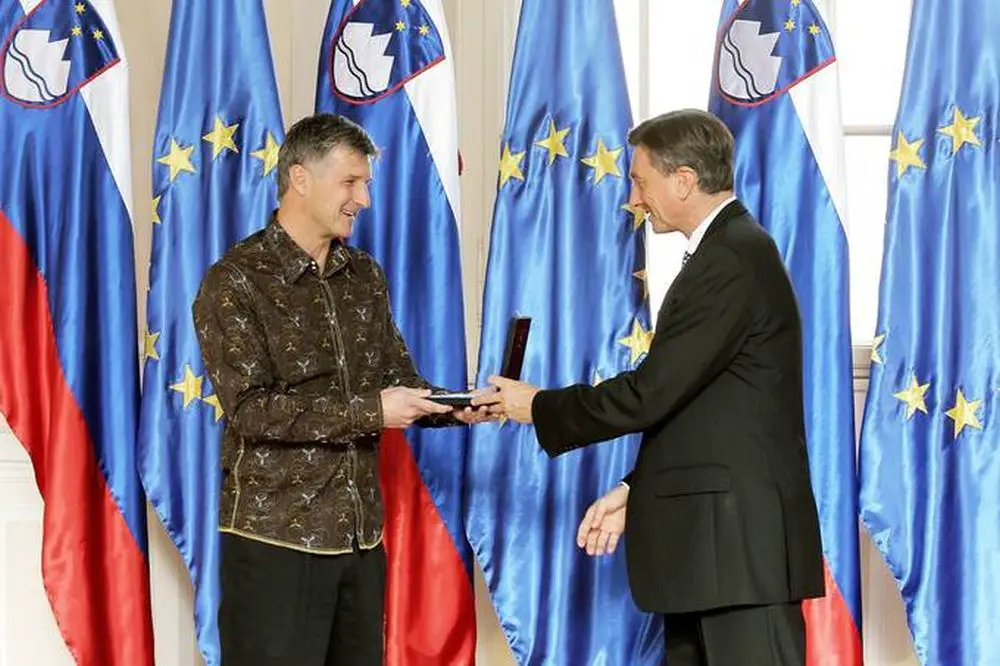
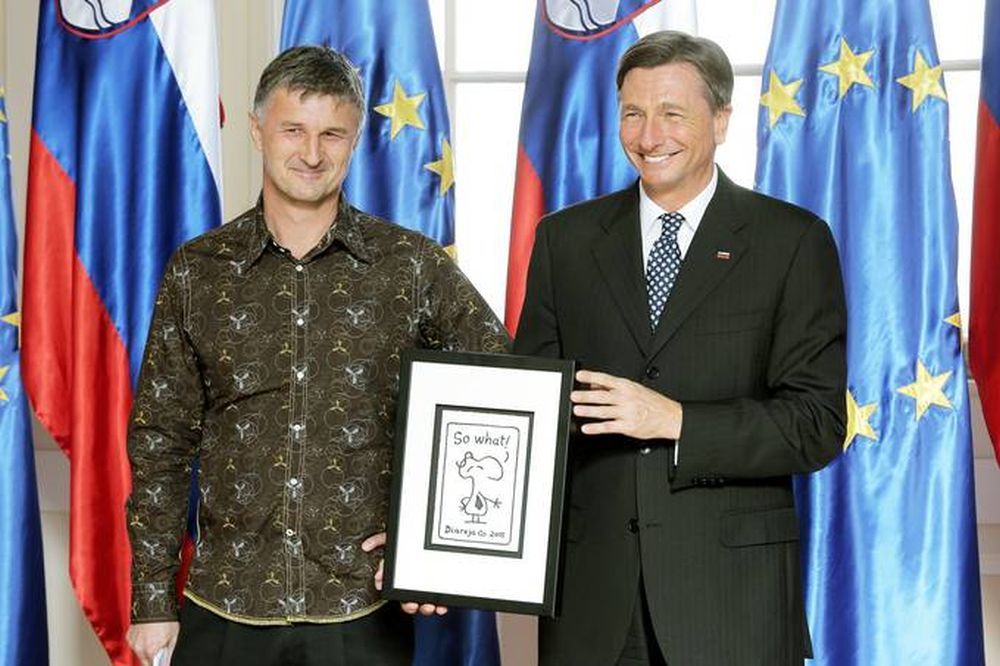
Apology
Much Honourable Madam Ambassador of the Republic of Hungary,
Accept my sincere and profound apology for a rude and completely untruthful depiction of your president Mr. Orbán on the cover of Mladina, which justifiably instigated your feelings of indignation and sadness.
After reading your concerned letter, I turned inside myself and realised my fault. I know that the anguish caused cannot be erased, but in my defence allow me nevertheless to explain that I myself am also just an innocent victim of objective circumstances. Let me point my finger at the real culprits of this undesirable scandal. These are:
- First, of course, a long-term communist education system which washed my brains and numbed my sense for nation and religion.
- Next to blame are my lackadaisical and inattentive superiors at the editorial board of Mladina, who should have better supervised me and stopped in time, as they know well that I am irresponsible and naïve in political matters, and just think that everything is allowed.
- And last but not least to blame is our permissive judiciary system, which fails to harshly and swiftly punish such social deviations.
I am urging you, madam, not to give up on us, but to continue to kindly help us with your advice and benevolent criticism, so that we too can achieve an exemplary state of objectivity and speak in one voice, as you have managed to establish in the Hungarian media, and that one day we too can live our lives under the rule of order and peace, national purity and Christian love for all the people behind the wire fence, as commanded by your mild and righteous beloved leader V. Orbán.
With all due respect,
Tomaž Lavrič, house caricaturist
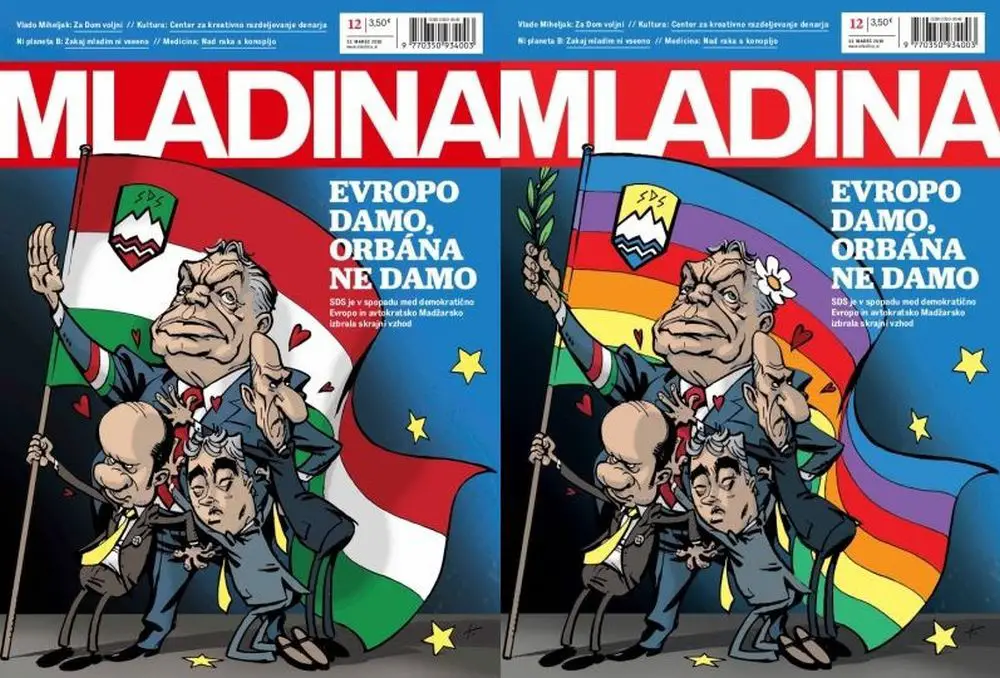
To explain the main problem behind the “outrageous” cover of Mladina, Demokracija also quoted the Hungarian government spokesperson Zoltán Kovács: “It’s an outrage and unacceptable first and foremost to the memory of the victims of that horrible period [World War 2]. Little surprise that the leftist editors at Mladina dislike the policies of the Orbán Government, but comparing the events of today’s Europe with the Nazi era trivialises what really happened in that dark time. (…) According to the author, Hungary’s firm opposition to immigration under the Orbán Government and our determination to protect European culture, which is deeply rooted in Christianity, is akin to the notorious German concept of Lebensraum.”
To understand the line of deduction here one might perhaps begin with the premise outlined by Milan Zver, MEP (depicted kneeling on the cover of Mladina) in his 2017 speech at the Pan-European Memorial for the Victims of Totalitarianism in Brussels: “Slovenia is the only state in the EU that has survived all three totalitarianisms: Fascism, Nazism and Communism. While the first two have practically disappeared, the process of the degradation of Communism has been too slow.” To paraphrase, we should not worry much about Nazism and Fascism, they are history. The Nazism of today is Communism, everything else is freedom fighting.
Furthermore, Kovács writes that “while everyone has the right to express an opinion, there’s also the matter of discretion and professionalism” and notes that Mladina’s function used to be the one of a “mouthpiece of the youth wing of the Communist Party”. Surely the Hungarian government spokesperson is aware of the fact that the lack of “discretion and professionalism” on the side of Mladina’s editors allowing for “juvenile and cynical” behaviour of its journalists has a long history which includes the imprisonment of three of its journalists (and one YPA sergeant) by the Yugoslav People’s Army in 1988, one of whom being no other than the leader of the SDS and admirer of Viktor Orbán’s policies, Janez Janša. At the time the arrests sent people onto the streets and launched Janez Janša’s career as a hero.

Another article by Nova24TV that followed on Monday, takes a similar path with regard to newspeak on contemporary sources of totalitarian danger. The author finds the Hungarian diplomatic protest “reasonable” since “if you were labelled Nazi by the media in the former Eastern bloc, which also included Hungary and Slovenia, it meant you were already on your way to gulag or being covered by soil. Also in Slovenia. The reaction [to the Hungarian reaction] bares a witness that this tradition is still alive. When a leftist weekly calls you a fascist, you aren’t even allowed to express your disagreement.”
If we may interrupt this narrative with a little correction – while Hungary was part of the Eastern Bloc and one of the Soviet satellites, Slovenia was not really, and certainly not since the Tito-Stalin split of 1948. Nova24TV then continues with a speculation on possible reasons behind the “panic on the left”, caused by the Hungarian diplomatic note of protest: “it is probably a combination of pre-election time, when the left is hoping for new voters with the use of an old policy of attacking external and internal enemies (fascists and such) and fear, because Orbán in fact exposes their modes of handling and controlling the media.”
Following this, Nova24TV published another article in full support of Generation Identity, a far-right movement associated with the recent “lone wolf” terrorist attack in Christchurch, New Zealand, titled “The Truth is our Weapon Against the Mainstream Media Lies”.
Mladina: Hungary's attempts to control the Slovenian media
STA, 5 April 2019 - The left-wing weekly Mladina, which put a cartoon of Hungarian Prime Minister Viktor Orbán performing the Nazi salute on its cover two weeks ago, discusses in its latest commentary the Hungarian ambassador asking the Slovenian government to prevent Mladina from portraying Orban in such a way in the future.
Related: A Round-up of news on Mladina’s “Nazi Orban” cover
The verbal note, which is how such a letter is called in diplomacy, and which was addressed to the Slovenian Foreign Ministry, was "not very diplomatic, but unusually sharp," editor-in-chief Grega Repovž says under the headline Slovenia's Sovereignty Threatened.
"We asked for explanation and confirmation from the ministry, which said that it had received the note. The ministry answered it by saying that it consistently respected the principle of freedom of the press and expression and that it neither interfered in editorial policy of the Slovenian media, nor it assessed it."
Repovž notes that the response of the ministry headed by Miro Cerar was a response "of a serious country - cold and not allowing any debate."
The revealed diplomatic note shows how serious the situation is and who are we dealing with - not only Slovenia, but the entire Europe. "A country which dares to demand from another country's government to act against journalists means a serious security threat to the entire region."
Mladina goes on to say that Hungary is a "country which does not hide that it tries to encroach upon the autonomy of the Slovenian state with capital and all other ways."
With no reservations, Hungary has encroached upon the Slovenian political space and subordinated the opposition Democrats (SDS) of Janez Janša, whose acts have been following Hungarian political interests for quite a while.
"Through the SDS, the Hungarian state has acquired a part of the Slovenian media, which are now associated into a Hungarian national propaganda company. Of course, they represent Hungarian interests and attack the Slovenian state and its institutions."
The Hungarian government also systematically awards citizenship to the residents of the bordering region of Pomurje, makes business investments there and finances social activities. It also wanted to get an outlet to the sea through investing in the port of Koper, Mladina adds.
There are many other examples - for instance a photograph of Ambassador Edit Szilágyiné Bátorfi taken at the embassy in Ljubljana. Behind her is a historical map of a Greater Hungary, in which Pomurje is a part of it.
"They don't even bother concealing their aspirations. No serious country in Europe would tolerate such a shameless and revisionist boasting by a representative of a neighbouring country," concludes the commentary.
Demokracija: Šiško's sentencing will fall at ECHR
STA, 4 April 2019 - The right-wing weekly Demokracija says in its latest commentary that the sentencing of self-styled militia leader Andrej Šiško to eight months in prison for trying to subvert the constitutional order will fall at the European Court of Human Rights (ECHR), if not earlier, at the Constitutional Court.
Foreign Minister Miro Cerar said that the sentencing was a win for the rule of law, but he is wrong. A win for the rule of law will be when Slovenian courts stop violating the Constitution and human rights and fundamental freedoms.
"Šiško's sentencing will fall at the ECHR at the latest, and probably already at the Constitutional Court," says Jože Biščak, the editor-in-chief of the right-leaning weekly under the headline When Orwell Meets Slovenia.
"If someone who parades in a forest in the middle of the day, who wants change of the authorities and who wants to establish a Štejerska Land records all of it and publishes it on the internet subverts the constitutional order, then we are really pathetic."
If the police and prosecution react before anything happens at all, everything is probably a show for the public, if not paranoia. "Now think about the numerous (also publicised) cases of violence when the state was able to intervene in schools and families only after the fact."
This is why the question why the Šiško case was given a different treatment while practically nothing happened is not only a rhetorical one, concludes the commentary.
All our posts in this series can be found here
STA, 5 April 2019 - The weekly Mladina revealed that the Hungarian embassy had protested with the Foreign Ministry asking it to intervene over a Mladina cover portraying Hungarian PM Viktor Orbán as a Nazi. The news prompted condemnation from journalists and a joint session of the parliamentary culture and foreign policy committees is to be held to discuss the issue.
The ministry confirmed it had received a verbal diplomatic note from the embassy protesting a "politically irresponsible cover of Mladina" from 22 March and asking the ministry for "assistance in preventing similar incidents in the future".
The cover shows cartoons of the Slovenian Democrats (SDS) head Janez Janša, SDS deputy Branko Grims and SDS MEP Milan Zver snuggling with the towering Orban, who performs the Nazi salute in front of a Hungarian flag with the Slovenian coat of arms.
The note says that the "cover violates the principles of freedom of the press and expression and that the acts such as the publication of the cover harm the otherwise excellent bilateral cooperation of our countries".
The ministry answered by saying it "consistently respects the principle of freedom of the press and expression and that it neither encroaches upon editorial policy of the Slovenian media, nor assesses it."
The weekly said that the note followed a letter sent to Mladina by Ambassador Edit Szilágyiné Bátorfi, in which she said that Mladina did not strive for friendship between the two nations and that its articles did not reflect facts.
Also writing about the cover this week was Orbán's spokesman Zoltán Kovács, who said he was "not surprised by the historically confused and unprofessional stance of Mladina", which he labelled the "former mouthpiece of the Communist Party".
The weekly attributes Hungary's reaction to the cartoon going viral last week in the public, with "almost all of the remaining independent Hungarian media reporting on it".
The embassy's note was condemned by the Slovenian Journalist Association (DNS), which said the embassy wanted the ministry to "encroach upon the editorial autonomy of a media outlet", and that it was "proof of the seriousness of the situation in the so-called democratic Europe."
The association said that the embassy's comments were not only completely unacceptable, but also an "unheard-of expression of a conception of complete control and disciplining of the media by the authorities".
"At the same time, the note is another concrete example of how the government of an officially democratic country, a member of the EU and NATO, perceives the role of the media in society," the DNS added.
A joint session of the parliamentary culture and foreign policy committees is to be held to discuss the note.
The session was requested by coalition Modern Centre Party (SMC) deputy Gregor Perič, who welcomed the "determined response by the ministry", labelling the Hungarian embassy's request as "completely unacceptable".
"It points to a huge departure of the Hungarian authorities from freedom of the press as it is generally understood by the majority in the joint European family," added the member of the EU Affairs Committee.
The chair of the Foreign Policy Committee, Matjaž Nemec of the coalition Social Democrats (SD), welcomed the initiative and said he expected the joint session to be called within the shortest possible time.
"Such inadmissible (non-)diplomatic pressure should be opposed in the most determined manner possible," Nemec said, adding that freedom of the press was one of the fundamental values of Slovenian society.
The chair of the parliamentary Culture Committee, Violeta Tomić of the Left, also supports the idea of the joint session. She said that in Hungary critical and free media had virtually disappeared under Orbán.
Mladina said that many tenured diplomats said they had never seen such a note. Roman Kirn, the former foreign policy advisor to the prime minister, said "such notes are unusual for countries where freedom of the press is respected."
The weekly said Hungary's influence on Slovenian politics was not negligible. "The largest Slovenian parliamentary party, the SDS, is today the biggest debtor to Orban, whose regime controls a part of internal affairs in Slovenia."
"We had the opportunity to learn this during the debate within the European People's Party (EPP) on the expulsion of Orban's Fidesz from the group: the Slovenian representatives defended him the most," added Mladina, which also dedicated today's editorial to the issue.
In the commentary, editor-in-chief Grega Repovž said the protest note was "not very diplomatic, but unusually sharp," and added that the response from the ministry was a response "of a serious country - cold and not allowing any debate."
Referring to Hungary, Repovž said that the entire Europe was dealing with "a country which dares to demand from another country's government to act against journalists", labelling it a serious security threat to the entire region.
He went on to say that Hungary was a "country which does not hide that it tries to encroach upon the autonomy of the Slovenian state with capital and all other ways."
All our stories about Hungary and Slovenia are here, while all those about Mladina are here
Regular readers of Mladina, the left-leaning review whose editorials we summarise each weekend (along with those of the right-leaning Demokracija, and – on occasion – Reporter) may have noticed the arresting advertisements that appear on page 3, and yet which don’t seem to promote any company or product.
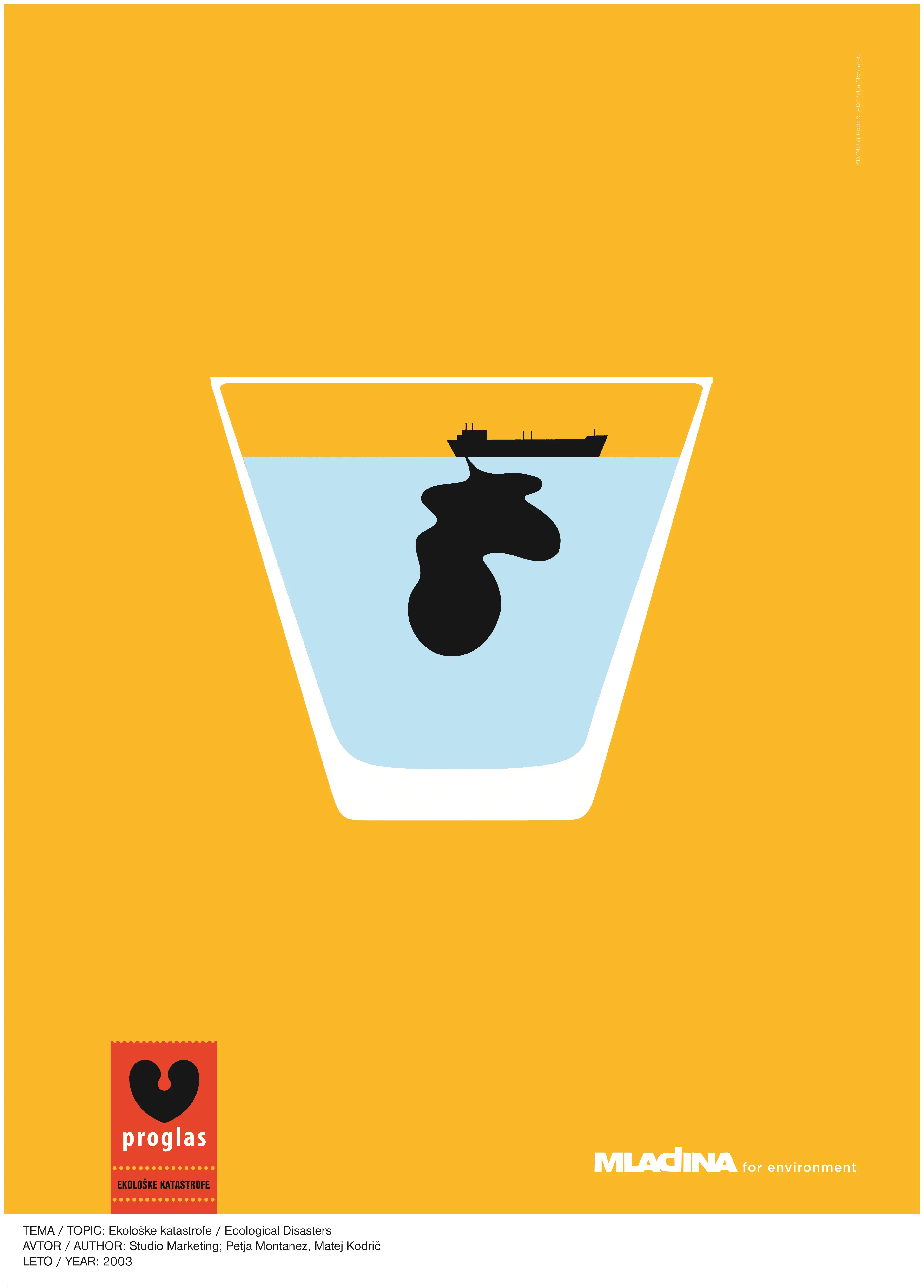
Theme Ecological Disasters. Author: Studio Marketing; Petja Montanez, Matej Kodrič

Theme: Genetic engineering. Author: Studio 360, Agencija Tovarna vizij, Vladan Srdić, Dragan Arrigler
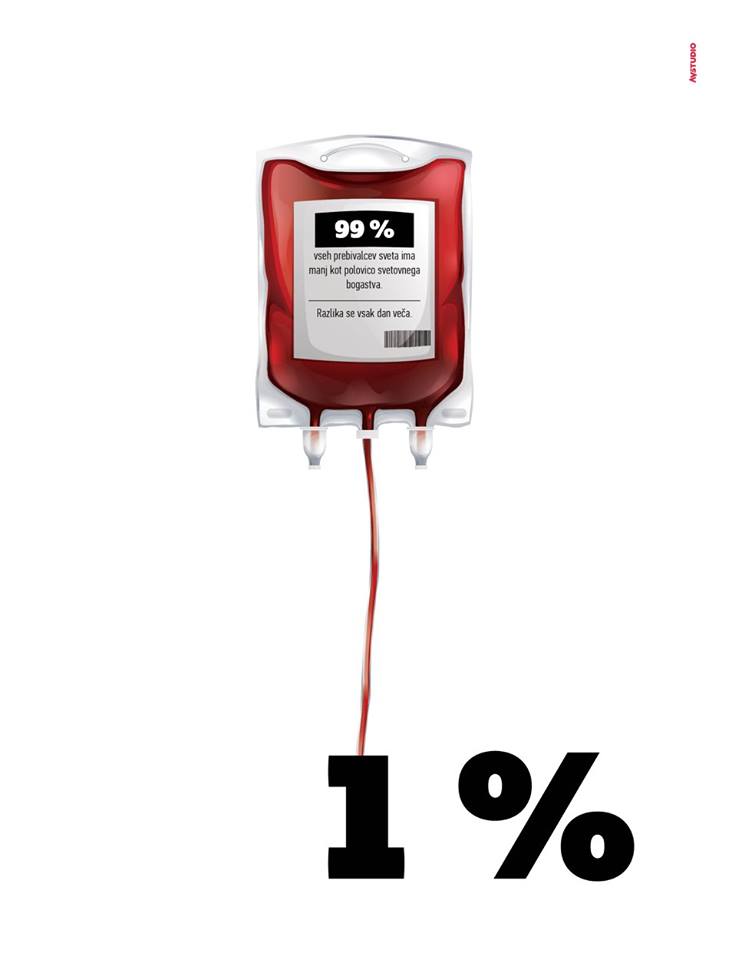
Theme: Greed. Author: AV Studio
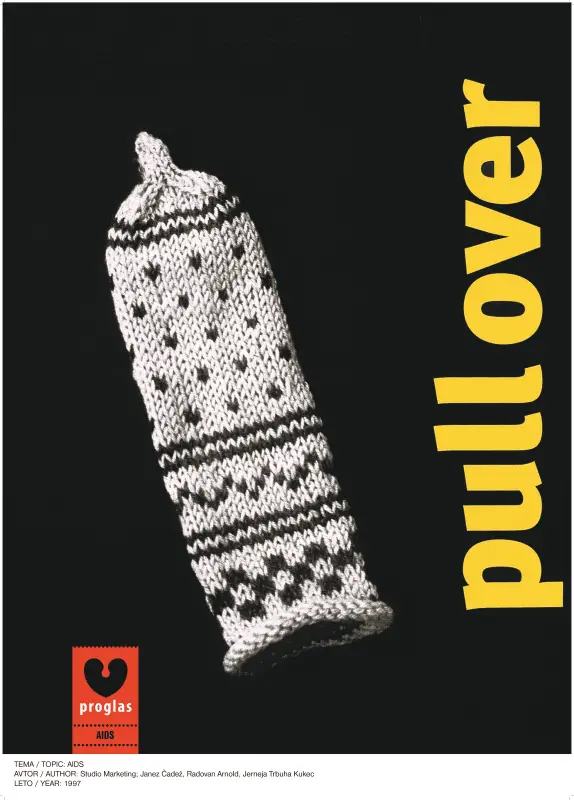
Theme: AIDS. Author: Studio Marketing; Janez Čadež, Radovan Arnold, Jerneja Trbuha Kukec

Theme: Greed. Author: SOZD
The page, known as Proglas and edited by Viva Videnovic for almost two decades, has been a feature of the magazine since 1997. It was introduced to provide a platform for Slovenian creatives to use the tools of their trade to engage in social commentary, enabling them to demonstrate their ingenuity and wit to a degree that’s not always possible with regular advertising.

Theme: Extremism. Author: Yin + Young
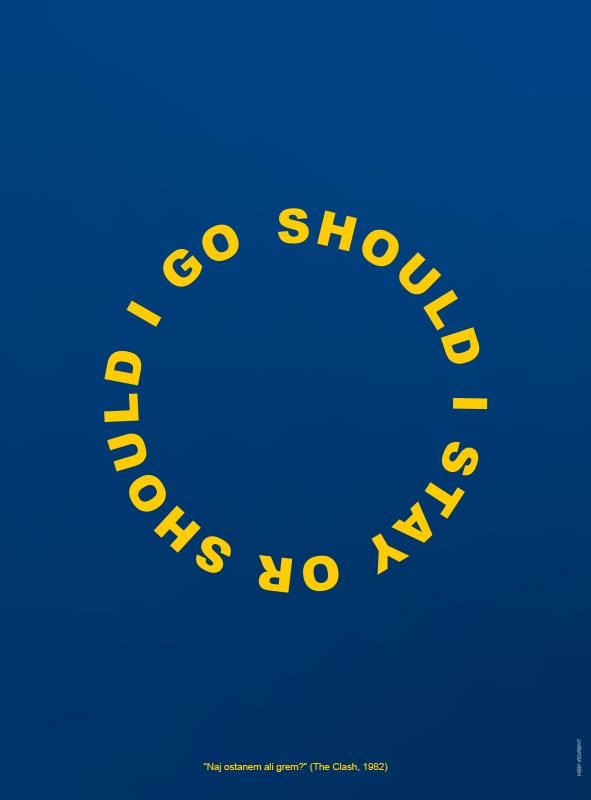
Theme: EU. Author: New Moment Ljubljana

Theme: Loneliness. Author: Pristop

Theme: Child abuse. Author: Mediamix; Toni Tomašek, Miha Bevc, Aleksandar Jordačevič
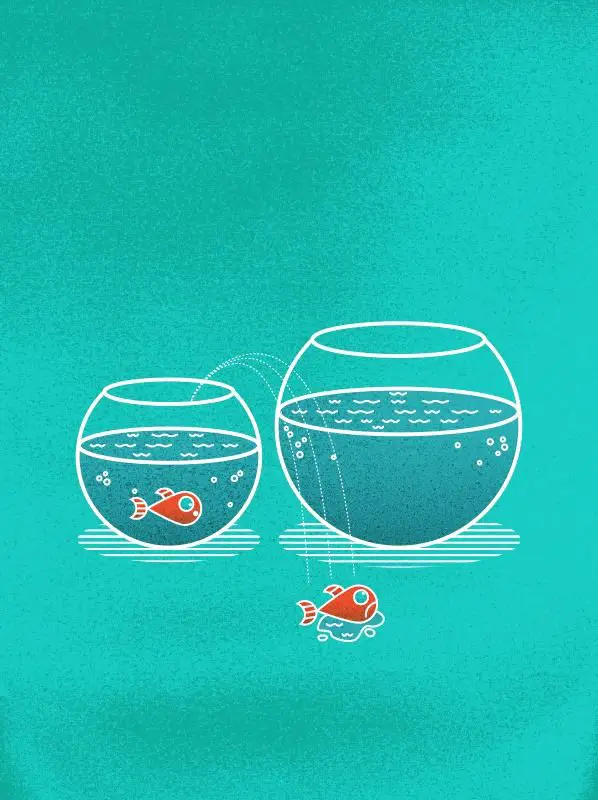
Theme: Success. Author: Yin + Young
In exchange for working pro bono, Mladina gives the contributors total freedom to create whatever they want, as long as it addresses that month’s theme. These have included all the pressing or passing social issues of the day, such as AIDS, mental health, over-consumption, social media, feminism, genetic engineering, economic imperialism, ecological catastrophes, fascism, tourism, sexual harassment, the precariat and so on.
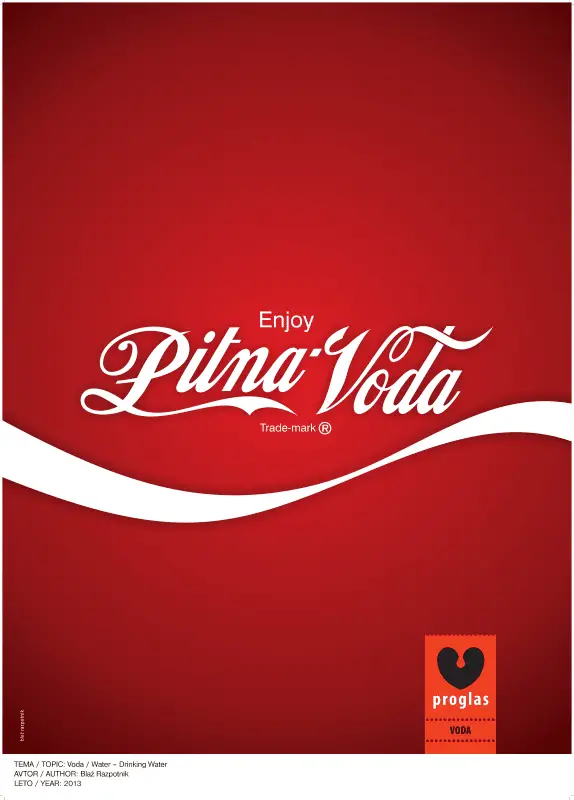
"Enjoy drinking water" Theme: Water. Author: Blaž Razpotnik
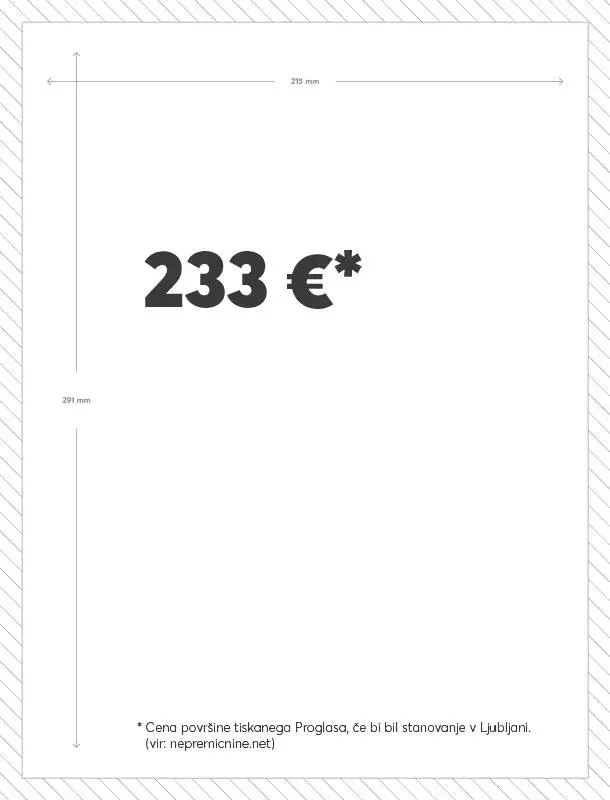
(How much a space the size of a page of Mladina - 291mm x 215mmwould cost in Ljubljana). Theme: Apartments. Author: Pristop
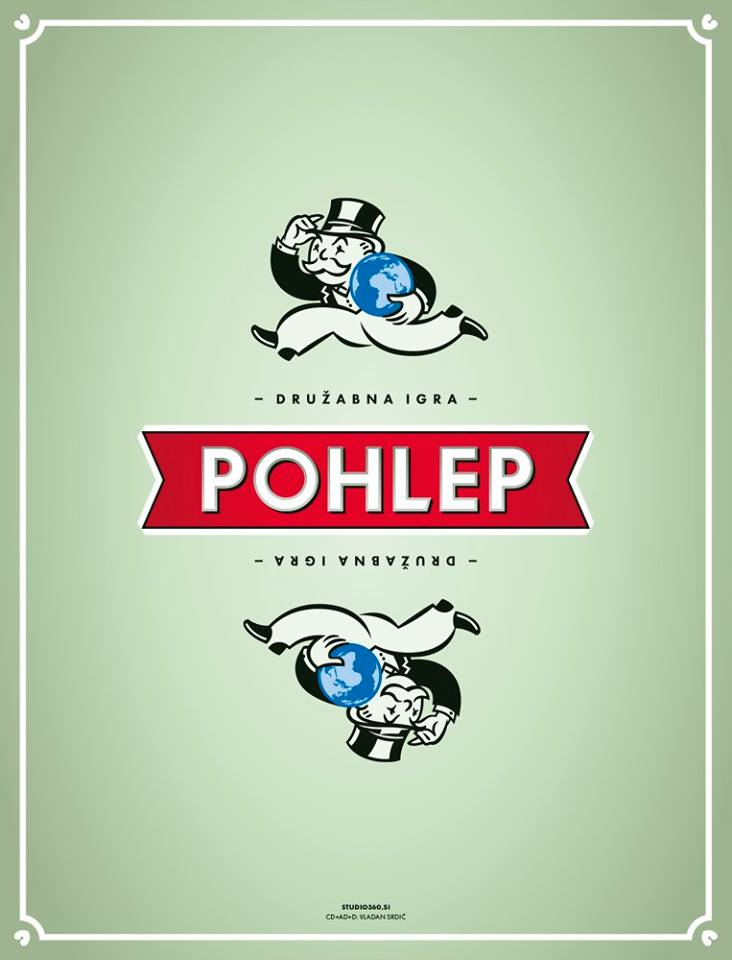
Theme: Greed. Author: Studio 360, VladanSrdić
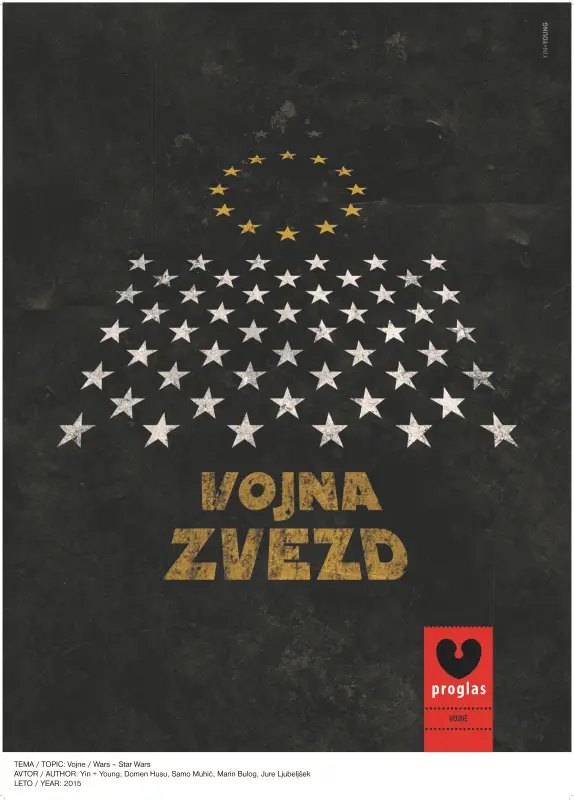
"Star Wars" Theme: War. Author: Yin + Young, Domen Husu, Samo Muhič, Marin Bulog, Jure Ljubeljšek
What you see in this story are thus just a few of the more than 1,000 works that have been published over the years. If you’d like to see more of Proglas, and what the Slovenian advertising industry is capable of when allowed to do what it wants, then follow the related page on Facebook, or see the whole archive on Mladina.
Mladina: Who is opposed to changing the system of supplementary health insurance, and why?
STA, 29 March 2019 - The left-wing weekly Mladina looks into the reasons for the opposition to the idea to abolish supplementary health insurance in its latest commentary, noting that it is more than 15 years old, much older than the Left, which usually gets credit for the idea.
"The people who are screaming about excessive public spending are also screaming about the Left (and the coalition) wanting to take EUR 500m away from healthcare by forcing the idea," editor-in-chief Grega Repovž says in Crazy World.
"The idea to abolish supplementary health insurance is much older than the Left. It is more than 15 years old. It has been present since it was revealed that some lobbies are using it to literally cut away a part of public money they collect instead of the state."
According to Repovž, these lobbies are turning this money around on financial markets, take their 10% and then return it to the state. "This would have been abolished everywhere long ago. But not in Slovenia. Let's see why this is. Because the reasons are actually very banal, shallow and evil."
The coalition is not actually proposing abolition of supplementary health insurance, but its merging with compulsory insurance. The catch is that people with lower income would pay less, up to 20 euros a month, and those with higher income would pay more, up to 70 euros.
A majority of the decision-making MPs, officials, directors - the entire upper class, would pay more, and the thing is that they do not want to pay more. They instead let three private insurers to get their EUR 60m every year from the people.
In short, the entire upper class is pretending ignorance and does not want to shoulder its share of costs for healthcare, the share proportionate to their income. This is why they are willing to lie that the coalition (and the Left) wants to take EUR 500m away from the healthcare sector.
"Well, the question is on whose side the new health minister is. He has not been convincing so far, but he belongs to the party of the prime minister, who has committed to implementing this objective in the agreement with the Left."
It is very easy to explain the reasons for abolition of supplementary health insurance to the public, for example with the situation of general practitioners, concludes the commentary.
Demokracija: Fidesz helps EPP ahead of EU election
STA, 28 March 2019 - The right-wing weekly Demokracija says in its latest commentary that the European People's Party (EPP) members made the right decision in not expelling the party of Hungarian Prime Minister Viktor Orban and thereby diminishing EPP leader Manfred Weber's chances of becoming the next president of the European Commission.
Last week, Weber faced the serious threat of a discord in the EPP right ahead of the EU elections, and a possible break-up of the group was not excluded either, as some parties had announced they would leave the EPP if Fidesz was expelled or forcedly suspended.
At first, it seemed that a majority of the EPP members were leaning towards such a proposal from 13 members, as this was supposed to be the key to success of Christian democrats in the May elections, editor-in-chief Jože Biščak says in EPP's Training Day in Brussels.
But after the speech by Janez Janša, the head of the Slovenian Democratic Party (SDS), who seriously warned that such a decision could cause irreparable damage, the scales tipped to the other side and Orban's proposal for a six-month suspension was accepted.
A continuation of the dispute would mostly benefit the political groups on the left, as socialist Frans Timmermans would easily beat Weber, Biščak says, noting that the solution was temporary, as everybody is waiting for the election result.
The compromise between the EPP and Fidesz is the best solution for European conservatives at the moment, as they remain (at least seemingly) unified, and one can say that Orban did a favour to Weber.
As projections suggest, Orban will be a great winner of the EU elections in Hungary, and Weber's chances of becoming the next president of the European Commission would have dropped drastically had Fidesz left the EPP, as it would be followed by more parties. Actually, it would be mission impossible, concludes the commentary.
All our posts in this series can be found here




